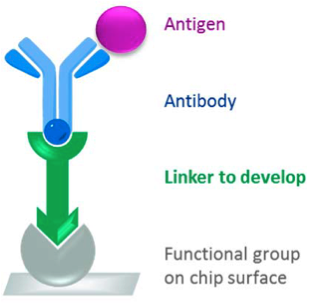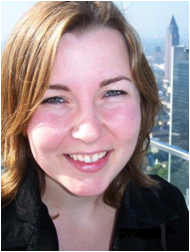Go to
Florine Duval
Oriented immobilization of antibodies on biosensor surface
The project aims at developing a biosensor which would allow the diagnosis of depression, based on the detection of biomarkers such as brain-derived neurotrophic factor (BDNF)1. Several sensing techniques are available, but the principle is similar for all of them: “Capture antibodies” are immobilized on a chip. The sample to be analyzed is added, target antigens (e.g. BDNF) bind to the capture antibodies. The binding event results in a signal which can be translated into the antigen concentration.
Our part of this project is to develop a suitable surface chemistry for the immobilization of capture antibodies on the sensor chips. Very low concentrations (around 1 pM) of biomarkers need to be detected, therefore a maximum number of binding sites should be available for binding the biomarkers.

The binding of a model antibody to protein A/G and to simple boronic acids on a sensor chip was examined by surface plasmon resonance. Boronic acids showed a similar behavior as protein A/G, and a potential for antibody immobilization. The drawback of these ligands is the reversibility of their binding with antibodies.
The aim of the current research is to develop linkers which would allow an irreversible and oriented antibody immobilization. Later on we will use the same chemistry for the development of a biosensor for the diagnosis of depression.
1 E.A.J. Arnoldussen et al., WO 2011, 002292.
About the speaker:
 Florine Duval studied general chemistry in France for 5 years, with a focus on organic chemistry. She received in 2009 a “Diplôme d’Ingénieur Chimiste” from the National Graduate School of Chemistry in Montpellier (ENSCM), together with a Master’s degree from the University of Montpellier (UM2). Since 2010, she is a PhD student in the Laboratory of Organic Chemistry of Wageningen University, supervised by Han Zuilhof and Teris van Beek. The ultimate goal of the project she participates in is the multiplex detection of biomarkers for the diagnosis of depression. Florine mainly focuses on the surface chemistry for a favorable antibody immobilization on various substrates.
Florine Duval studied general chemistry in France for 5 years, with a focus on organic chemistry. She received in 2009 a “Diplôme d’Ingénieur Chimiste” from the National Graduate School of Chemistry in Montpellier (ENSCM), together with a Master’s degree from the University of Montpellier (UM2). Since 2010, she is a PhD student in the Laboratory of Organic Chemistry of Wageningen University, supervised by Han Zuilhof and Teris van Beek. The ultimate goal of the project she participates in is the multiplex detection of biomarkers for the diagnosis of depression. Florine mainly focuses on the surface chemistry for a favorable antibody immobilization on various substrates.
Secondary navigation
- EPFL Workshop on Logic Synthesis and Emerging Technologies
- Luca Amaru
- Luca Benini
- Giovanni De Micheli
- Srini Devadas
- Antun Domic
- Rolf Drechsler
- Pierre-Emmanuel Gaillardon
- Jie-Hong Roland Jiang
- Akash Kumar
- Shahar Kvatinsky
- Yusuf Leblebici
- Shin-ichi Minato
- Alan Mishchenko
- Vijaykrishnan Narayanan
- Ian O'Connor
- Andre Inacio Reis
- Martin Roetteler
- Julien Ryckaert
- Mathias Soeken
- Christof Teuscher
- Zhiru Zhang
- Symposium on Emerging Trends in Computing
- Layout synthesis: A golden DA topic
- EPFL Workshop on Logic Synthesis & Verification
- Luca Amaru
- Luca Benini
- Robert Brayton
- Maciej Ciesielski
- Valentina Ciriani
- Jovanka Ciric-Vujkovic
- Jason Cong
- Jordi Cortadella
- Giovanni De Micheli
- Antun Domic
- Rolf Drechsler
- Henri Fraisse
- Paolo Ienne
- Viktor Kuncak
- Enrico Macii
- Igor Markov
- Steven M. Nowick
- Tsutomu Sasao
- Alena Simalatsar
- Leon Stok
- Dirk Stroobandt
- Tiziano Villa
- Symposium on Emerging Trends in Electronics
- Raul Camposano
- Anantha Chandrakasan
- Jo De Boeck
- Gerhard Fettweis
- Steve Furber
- Philippe Magarshack
- Takayasu Sakurai
- Alberto Sangiovanni-Vincentelli
- Ken Shepard
- VENUE
- Panel on Circuits in Emerging Nanotechnologies
- Panel on Emerging Methods of Computing
- Panel on The Role of Universities in the Emerging ICT World
- Panel on Design Challenges Ahead
- Panel on Alternative Use of Silicon
- Nano-Bio Technologies for Lab-on-Chip
- Functionality-Enhanced Devices Workshop
- More Moore: Designing Ultra-Complex System-on-Chips
- Design Technologies for a New Era
- Nanotechnology for Health
- Secure Systems Design
- Surface Treatments and Biochip Sensors
- Security/Privacy of IMDs
- Nanosystem Design and Variability
- Past Events Archive
